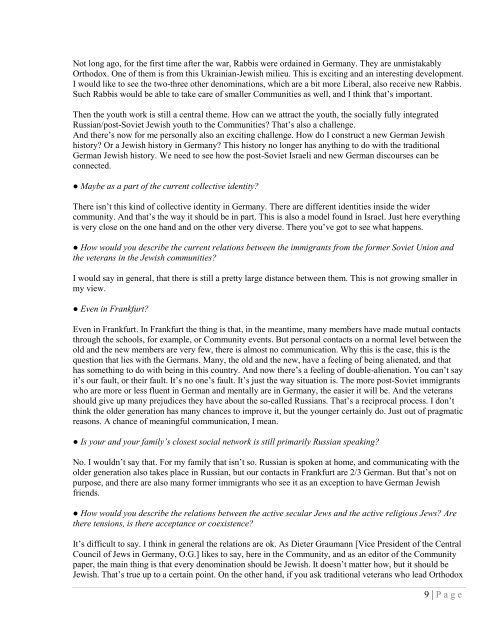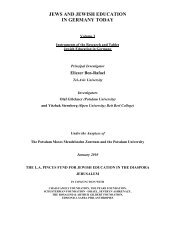jews and jewish education in germany today - The Westbury Group
jews and jewish education in germany today - The Westbury Group
jews and jewish education in germany today - The Westbury Group
You also want an ePaper? Increase the reach of your titles
YUMPU automatically turns print PDFs into web optimized ePapers that Google loves.
Not long ago, for the first time after the war, Rabbis were orda<strong>in</strong>ed <strong>in</strong> Germany. <strong>The</strong>y are unmistakably<br />
Orthodox. One of them is from this Ukra<strong>in</strong>ian-Jewish milieu. This is excit<strong>in</strong>g <strong>and</strong> an <strong>in</strong>terest<strong>in</strong>g development.<br />
I would like to see the two-three other denom<strong>in</strong>ations, which are a bit more Liberal, also receive new Rabbis.<br />
Such Rabbis would be able to take care of smaller Communities as well, <strong>and</strong> I th<strong>in</strong>k that’s important.<br />
<strong>The</strong>n the youth work is still a central theme. How can we attract the youth, the socially fully <strong>in</strong>tegrated<br />
Russian/post-Soviet Jewish youth to the Communities? That’s also a challenge.<br />
And there’s now for me personally also an excit<strong>in</strong>g challenge. How do I construct a new German Jewish<br />
history? Or a Jewish history <strong>in</strong> Germany? This history no longer has anyth<strong>in</strong>g to do with the traditional<br />
German Jewish history. We need to see how the post-Soviet Israeli <strong>and</strong> new German discourses can be<br />
connected.<br />
● Maybe as a part of the current collective identity?<br />
<strong>The</strong>re isn’t this k<strong>in</strong>d of collective identity <strong>in</strong> Germany. <strong>The</strong>re are different identities <strong>in</strong>side the wider<br />
community. And that’s the way it should be <strong>in</strong> part. This is also a model found <strong>in</strong> Israel. Just here everyth<strong>in</strong>g<br />
is very close on the one h<strong>and</strong> <strong>and</strong> on the other very diverse. <strong>The</strong>re you’ve got to see what happens.<br />
● How would you describe the current relations between the immigrants from the former Soviet Union <strong>and</strong><br />
the veterans <strong>in</strong> the Jewish communities?<br />
I would say <strong>in</strong> general, that there is still a pretty large distance between them. This is not grow<strong>in</strong>g smaller <strong>in</strong><br />
my view.<br />
● Even <strong>in</strong> Frankfurt?<br />
Even <strong>in</strong> Frankfurt. In Frankfurt the th<strong>in</strong>g is that, <strong>in</strong> the meantime, many members have made mutual contacts<br />
through the schools, for example, or Community events. But personal contacts on a normal level between the<br />
old <strong>and</strong> the new members are very few, there is almost no communication. Why this is the case, this is the<br />
question that lies with the Germans. Many, the old <strong>and</strong> the new, have a feel<strong>in</strong>g of be<strong>in</strong>g alienated, <strong>and</strong> that<br />
has someth<strong>in</strong>g to do with be<strong>in</strong>g <strong>in</strong> this country. And now there’s a feel<strong>in</strong>g of double-alienation. You can’t say<br />
it’s our fault, or their fault. It’s no one’s fault. It’s just the way situation is. <strong>The</strong> more post-Soviet immigrants<br />
who are more or less fluent <strong>in</strong> German <strong>and</strong> mentally are <strong>in</strong> Germany, the easier it will be. And the veterans<br />
should give up many prejudices they have about the so-called Russians. That’s a reciprocal process. I don’t<br />
th<strong>in</strong>k the older generation has many chances to improve it, but the younger certa<strong>in</strong>ly do. Just out of pragmatic<br />
reasons. A chance of mean<strong>in</strong>gful communication, I mean.<br />
● Is your <strong>and</strong> your family’s closest social network is still primarily Russian speak<strong>in</strong>g?<br />
No. I wouldn’t say that. For my family that isn’t so. Russian is spoken at home, <strong>and</strong> communicat<strong>in</strong>g with the<br />
older generation also takes place <strong>in</strong> Russian, but our contacts <strong>in</strong> Frankfurt are 2/3 German. But that’s not on<br />
purpose, <strong>and</strong> there are also many former immigrants who see it as an exception to have German Jewish<br />
friends.<br />
● How would you describe the relations between the active secular Jews <strong>and</strong> the active religious Jews? Are<br />
there tensions, is there acceptance or coexistence?<br />
It’s difficult to say. I th<strong>in</strong>k <strong>in</strong> general the relations are ok. As Dieter Graumann [Vice President of the Central<br />
Council of Jews <strong>in</strong> Germany, O.G.] likes to say, here <strong>in</strong> the Community, <strong>and</strong> as an editor of the Community<br />
paper, the ma<strong>in</strong> th<strong>in</strong>g is that every denom<strong>in</strong>ation should be Jewish. It doesn’t matter how, but it should be<br />
Jewish. That’s true up to a certa<strong>in</strong> po<strong>in</strong>t. On the other h<strong>and</strong>, if you ask traditional veterans who lead Orthodox<br />
9 | P a g e



